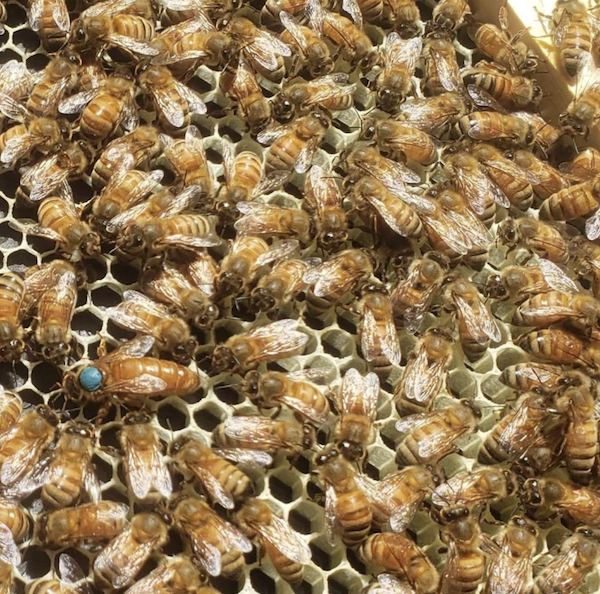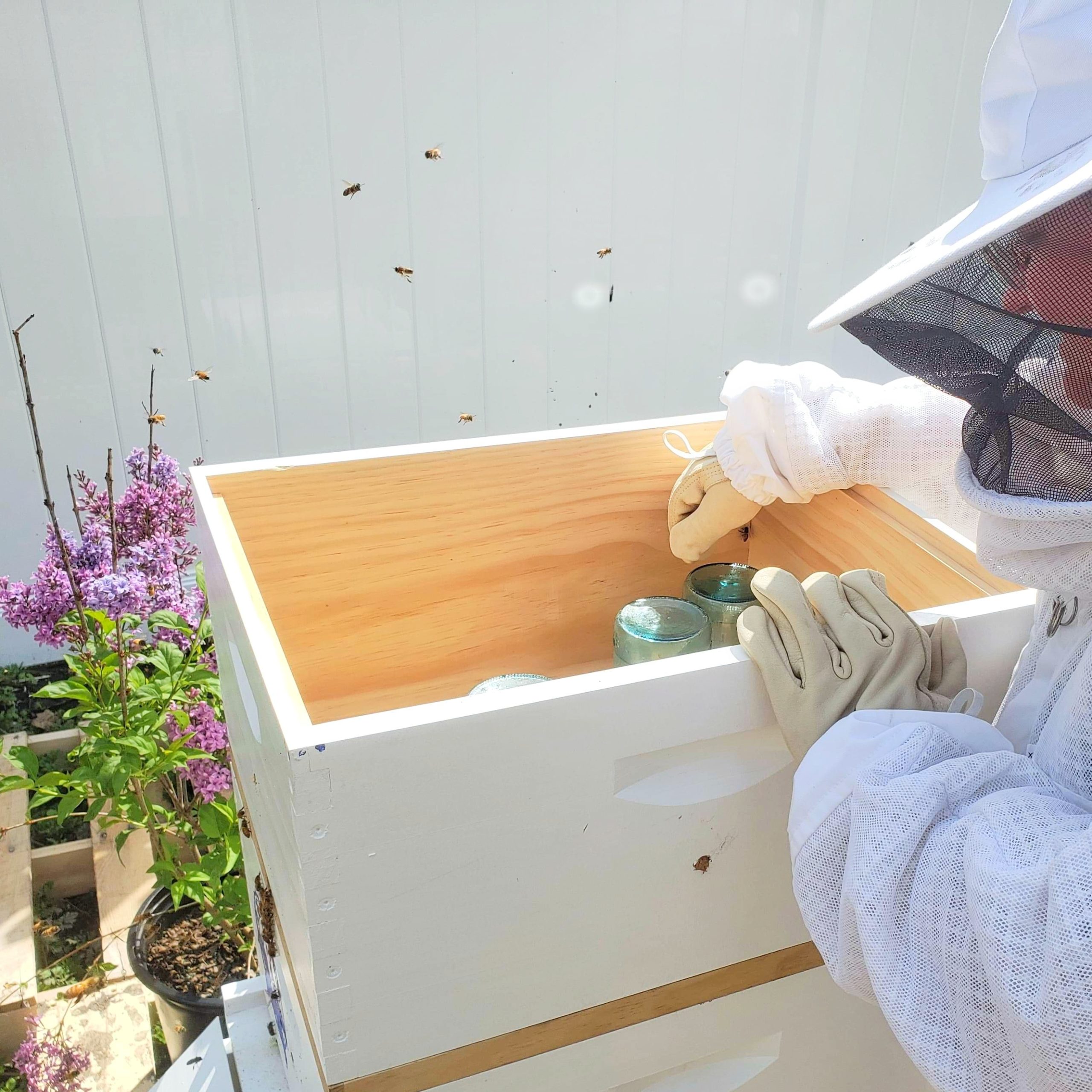Happy news on our little farm: the bees have moved in!

On Saturday the 2nd, we picked up our package of bees from Barker’s Beehives & Supplies in Oxford. A package of bees is a queen bee, plus about 10,000 worker bees, in a screened box with some sugar syrup — the start to our bee colony!
Picking up our package in these unusual times of social distancing was very strange, but worked efficiently. We had a specific time to come by, and stood among a carefully spaced out line of dozens of other beekeepers, both new and expanding. It was a great day to do the install (sunny and 65 degrees), and though we were disappointed not to be able to invite people over to watch the installation as planned, we did live stream it on Facebook and Instagram; thank you to everyone who joined us! A link to a video of our package installation is below.
Bee Package Install Video
 Since the installation, we’ve been keeping up on feeding our bees. Until new hives of bees have built up enough honeycomb to start storing nectar to feed themselves, you provide a sugar syrup for them to eat. Per the recommendation of our bee school (more praise for bee school coming later in this post!), we also add the supplement Honey B Healthy for our bees — a natural supplement that includes lemongrass oil and spearmint, to make the syrup extra appealing to the bees. They are very active and hungry bees, so we are giving them more food every several days so far!
Since the installation, we’ve been keeping up on feeding our bees. Until new hives of bees have built up enough honeycomb to start storing nectar to feed themselves, you provide a sugar syrup for them to eat. Per the recommendation of our bee school (more praise for bee school coming later in this post!), we also add the supplement Honey B Healthy for our bees — a natural supplement that includes lemongrass oil and spearmint, to make the syrup extra appealing to the bees. They are very active and hungry bees, so we are giving them more food every several days so far!
 We also did our first inspection, and though we couldn’t find the queen, we found the bees making great progress on building out comb. The weather has been a little up and down here, so our next big inspection is on Thursday, and I hope we’ll be able to find her then! If we can’t find her, we’ll make sure to find some baby bees growing so that we’ll know she is settled in well and healthy. Even though our queen is marked with a big blue dot, it can be harder to find the queen than you might think, since there are thousands of other bees crawling all around!
We also did our first inspection, and though we couldn’t find the queen, we found the bees making great progress on building out comb. The weather has been a little up and down here, so our next big inspection is on Thursday, and I hope we’ll be able to find her then! If we can’t find her, we’ll make sure to find some baby bees growing so that we’ll know she is settled in well and healthy. Even though our queen is marked with a big blue dot, it can be harder to find the queen than you might think, since there are thousands of other bees crawling all around!
It’s common for first-year beekeepers not to be able to extract any honey, because the bees have to spend a lot of time originally building out the honeycomb that they will then use year after year. But we are making sure we set up the best possible conditions to make this happen: We planted a bunch of native pollinator flowers around, including late-season goldenrod, and are going to be regularly checking in to make sure our bees are strong and healthy and don’t need anything from us.
 I know that I already sung the praises of bee school in my last post, but now that I have my bees, I wanted to just talk again about how great my bee school experience was. None of us were expecting that suddenly COVID-19 would hit and that our bee school would no longer be able to meet, but the Norfolk County Beekeepers Association very easily pivoted to teaching fully remote through Zoom. We also had an extra Q&A class at the end, and were offered mentorship. I got our diplomas printed out for fun as well, at Walpole Printworks.
I know that I already sung the praises of bee school in my last post, but now that I have my bees, I wanted to just talk again about how great my bee school experience was. None of us were expecting that suddenly COVID-19 would hit and that our bee school would no longer be able to meet, but the Norfolk County Beekeepers Association very easily pivoted to teaching fully remote through Zoom. We also had an extra Q&A class at the end, and were offered mentorship. I got our diplomas printed out for fun as well, at Walpole Printworks.

 National Pollinator Week is an official federal recognition of the importance of pollinators to our ecosystem, sparked particularly by colony collapse of honeybees. It became an official week in 2007 with unanimous approval by the US Senate.
National Pollinator Week is an official federal recognition of the importance of pollinators to our ecosystem, sparked particularly by colony collapse of honeybees. It became an official week in 2007 with unanimous approval by the US Senate.







 As a winter project, Jay and I have been attending the annual beginners’ beekeeping school run by the
As a winter project, Jay and I have been attending the annual beginners’ beekeeping school run by the  Signing up for bee school also made us club members, which means we can attend the monthly club meetings that have various topics; the first one we went to was about mead making!
Signing up for bee school also made us club members, which means we can attend the monthly club meetings that have various topics; the first one we went to was about mead making!